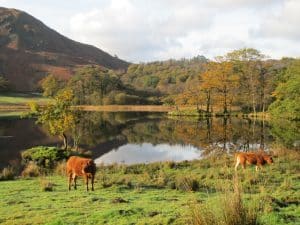Support us from £3/month
We deal with almost 1000 cases a year assisting communities, groups and individuals in protecting their local spaces and paths in all parts of England and Wales. Can you help us by joining as a member?
As Britain’s leading pressure-group for open spaces and common land, we welcome the announcement that the Lake District National Park will be added to the UNESCO World Heritage List.

Rydal Water Photo: Graham Bathe
The society’s chairman, Graham Bathe(1), said: ‘This announcement brings the fullest recognition that the Lake District is a cultural landscape of global importance, forged by the interplay of nature and human traditions over thousands of years. The designation is wonderful news for visitors who enjoy the beauty and wildlife of the area, and also those who farm and nurture the land. Cumbria has nearly a third of all the common land of England(2), and is a brilliant resource for access and wildlife.’
Hugh Craddock, one of the society’s case officers, added, ‘Commoning(3) is at the heart of the Lake District’s farming and cultural traditions, and is the key influence on what makes the Lake District fells so attractive to residents and visitors alike. We are delighted to welcome this long-awaited designation, and trust that it will mean the end of damaging proposals for development within the National Park.’
1 Graham Bathe is chairman of the Open Spaces Society.
2 Cumbria (including the Lake District) has 116,556 ha of common land, 31% of the total for England. It also contains a larger area of Sites of Special Scientific Interest than any other English county.
3 Commoning is the exercise of rights of common. In the Lake District, the rights are typically to graze the fells, are held by local farmers, are exercised in common alongside other farmers, and are exercised over land (i.e. ‘the common’) which is owned by someone else. The rights are attached to farm holdings, and frequently date back to or beyond the mediaeval period.
